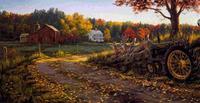Retrospective Series : Part 1 : A Lifeless Collection
 Growing up in a small town has its benefits and disadvantages. The disadvantages probably outweigh the benefits. The fact that an entire world filled with wonders waited outside, occasionally dawned on me, partly thanks to the loads of books that I read from the decrepit local library. Funded by the government, this dungeon of a place had dust collecting over its books. Layers of dust encrusted the books literally. After every visit to the library my mom would hand me a napkin at the doorstep, so that I could wipe the caked mud off the books. I would flip them over a couple of times and give the pages a nice ruffle, a humble effort to get rid of any insects that could potentially be hiding between the covers. After thoroughly washing my hands with soap I would then be allowed to enter the confines of my home. Even after all that ritual my mother never really overcame her unease with the dusty books being present in the house.
Growing up in a small town has its benefits and disadvantages. The disadvantages probably outweigh the benefits. The fact that an entire world filled with wonders waited outside, occasionally dawned on me, partly thanks to the loads of books that I read from the decrepit local library. Funded by the government, this dungeon of a place had dust collecting over its books. Layers of dust encrusted the books literally. After every visit to the library my mom would hand me a napkin at the doorstep, so that I could wipe the caked mud off the books. I would flip them over a couple of times and give the pages a nice ruffle, a humble effort to get rid of any insects that could potentially be hiding between the covers. After thoroughly washing my hands with soap I would then be allowed to enter the confines of my home. Even after all that ritual my mother never really overcame her unease with the dusty books being present in the house.It was to me a very lifeless collection. Lifeless because that is what it seemed to me during those days, especially when I was in 7th and 8th grade. Ironically, looking back, I realize that I given the smaller collection available to me, I ended up experimenting with unheard of authors. At least unheard and unimportant to me at that time. I had managed to read almost all of the classic works of English literature by the time I was in engineering school. I had read books ranging from the sleaziest of pulp fiction to the most philosophical treatises ever written by the likes of Fyodor Dostoevesky and Fredrick Neitzsche.
 Every kind of book was admissible regardless of genre, to kill time during the summer holidays. The incessant heat prevented me from playing outdoors during the day and the only recourse was to read. Encyclopedias, medical treatises, Plato and Socrates, Arthur Conan Doyle's Sherlock Holmes, Isaac Asimov and his Science Fiction, Thomas Hardy's 'Jude The Obscure', 'Return of the Native', Poems of John Keats and the list goes on and on. All of these works invariably made it into my list of reading material. What started out as a quest to read children's novels like the Hardy Boys and Britain's famed children's book writer Enid Blyton ended up as an amazing introduction to the classical works of literature.
Every kind of book was admissible regardless of genre, to kill time during the summer holidays. The incessant heat prevented me from playing outdoors during the day and the only recourse was to read. Encyclopedias, medical treatises, Plato and Socrates, Arthur Conan Doyle's Sherlock Holmes, Isaac Asimov and his Science Fiction, Thomas Hardy's 'Jude The Obscure', 'Return of the Native', Poems of John Keats and the list goes on and on. All of these works invariably made it into my list of reading material. What started out as a quest to read children's novels like the Hardy Boys and Britain's famed children's book writer Enid Blyton ended up as an amazing introduction to the classical works of literature.Talk of a lifeless collection.

Comments